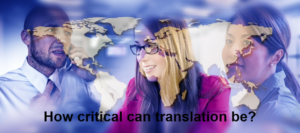
If you’re operating in your native country everyone speaks your language so documentation, signage and online material doesn’t need translation – or does it?
What happens if your organisation has visitors whose English isn’t particularly good? Is that their problem as they’re visiting your country?
Quite apart from it being good customer service to provide company information in the language of the visitor, there are some situations where it becomes more critical. If you have a business that is open to the public in any way – an art gallery, a zoo, a museum, a restaurant or bar, for instance – you might consider what happens in an emergency?
If you’re in a location where you get a fair percentage of overseas visitors providing multilingual signage to help people find the emergency exits could be the difference between life and death. While it may be disastrous to experience a fire that destroys valuable items, it’s even more disastrous if there are lives lost, simply because someone didn’t understand the emergency exit signs.
When you have a multi-national workforce having emergency documentation – like fire safety procedures – in more than one language can be good practice to ensure that safety is fully understood.
If you have a number of staff from Poland, Slovakia, Romania – get the main company documentation translated into their languages so you can be certain there are no misunderstandings.
But staff must speak English
There’s a big difference between conversational English and technical English. Health and Safety documentation leans towards the technical.
Being able to talk to a customer or visitor about the weather, their hotel, places to eat or how to find their way to a particular place isn’t the same as understanding the legal aspects of the company health and safety policy.
Outsourcing
It’s frequently more cost effective to outsource some activities. A good example is web design and development. In the digital world you can find good quality providers in many different countries and most speak at least some English. However, it may be worth having your brief translated into the native language of your chosen provider to ensure there are no gaps in understanding what you want.
Having material in other languages can expand your reach and enable people to do business with you. It will set you apart from your competitors and show you really care about your customers – and your staff.

